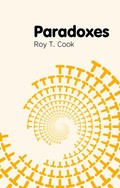Paradoxes
Key Concepts in Philosophy (Band Nr. 1)

1. Auflage Februar 2013
200 Seiten, Softcover
Wiley & Sons Ltd
Kurzbeschreibung
Paradoxes are arguments that lead from apparently true premises, via apparently uncontroversial reasoning, to a false or even contradictory conclusion. Paradoxes threaten our basic understanding of central concepts such as space, time, motion, infinity, truth, knowledge, and belief.
In this volume Roy T Cook provides a sophisticated, yet accessible and entertaining, introduction to the study of paradoxes, one that includes a detailed examination of a wide variety of paradoxes. The book is organized around four important types of paradox: the semantic paradoxes involving truth, the set-theoretic paradoxes involving arbitrary collections of objects, the Soritical paradoxes involving vague concepts, and the epistemic paradoxes involving knowledge and belief. In each of these cases, Cook frames the discussion in terms of four different approaches one might take towards solving such paradoxes. Each chapter concludes with a number of exercises that illustrate the philosophical arguments and logical concepts involved in the paradoxes.
Paradoxes is the ideal introduction to the topic and will be a valuable resource for scholars and students in a wide variety of disciplines who wish to understand the important role that paradoxes have played, and continue to play, in contemporary philosophy.
Paradoxes are arguments that lead from apparently true premises, via apparently uncontroversial reasoning, to a false or even contradictory conclusion. Paradoxes threaten our basic understanding of central concepts such as space, time, motion, infinity, truth, knowledge, and belief.
In this volume Roy T Cook provides a sophisticated, yet accessible and entertaining, introduction to the study of paradoxes, one that includes a detailed examination of a wide variety of paradoxes. The book is organized around four important types of paradox: the semantic paradoxes involving truth, the set-theoretic paradoxes involving arbitrary collections of objects, the Soritical paradoxes involving vague concepts, and the epistemic paradoxes involving knowledge and belief. In each of these cases, Cook frames the discussion in terms of four different approaches one might take towards solving such paradoxes. Each chapter concludes with a number of exercises that illustrate the philosophical arguments and logical concepts involved in the paradoxes.
Paradoxes is the ideal introduction to the topic and will be a valuable resource for scholars and students in a wide variety of disciplines who wish to understand the important role that paradoxes have played, and continue to play, in contemporary philosophy.
Introduction 1
1 The Care and Feeding of your New Paradoxes 9
2 The Truth about Truth 30
3 The Title of this Chapter Will Have its Revenge 62
4 Some Collections are Bigger and Badder than Others 91
5 Bald, Not Bald, and Kinda Bald 128
6 What We Know about What We Know 156
Conclusion: Many Paradoxes, One Solution? 186
References 197
Index 203
Graham Priest, University of Melbourne
"Paradoxes can be the springboard of profound discovery. This book presents paradoxes that matter, and explains why and how they matter. And the book does it all in a user-friendly style that's enjoyable to read. And what's more: the book is reliable, written by one of the leading researchers on the topic. This book is henceforth on my list of required readings for anyone looking to study the philosophy of logic or the interplay of paradoxes, logic, and philosophy generally. It's a great accomplishment by one of today's exciting philosophers."
JC Beall, University of Connecticut


